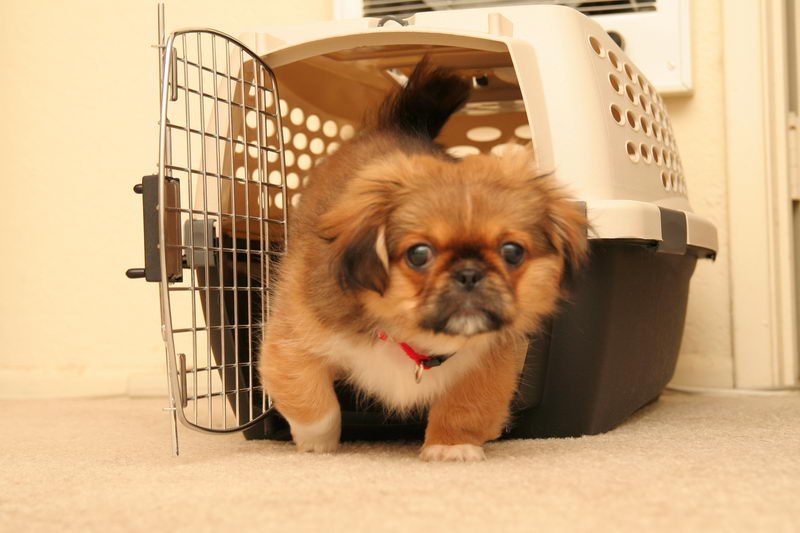If you are a new dog owner and have just been introduced to crate training, you are probably wondering, how long does it take to crate train a puppy?
Crate training is not an exact science; sure there are some steps that you follow to achieve that. However, the results will depend entirely on your puppy and his response to your training.
Many variants may affect how long it is going to take to crate train your puppy, some may have a small impact while others may completely change the game.
The breed of the dog, for instance, can affect the duration of the crate training, even small variants like how big of a dog you have; Some have small bladders, others have bigger ones. That could define how many times you will have to wake up per night to let the puppy eliminate.
We can prepare a crate training schedule but you ultimately will have to adapt it to your dog’s needs.
I myself have crate trained many dogs in recent years since I am a big pet lover and have had many puppies over the years.
Let me tell you I’ve never seen two dogs taking the same time to complete their crate training.
I most certainly got better at it, however, this never meant I can do it faster no matter what dog breed I have or what he’s been through.
Some bad experiences could be a major setback, especially for rescue dogs, that I find the hardest to crate train along with old dogs.
How long to crate train an 8 weeks old puppy

This may come as a surprise for some of you, but younger puppies are often the easiest to work with.
The younger the puppy the better results you get with the crate training and the faster you can achieve it. Of course, there are always other factors but based on my experience this is mostly the case.
I wrote an article about the best time to start crate training that I think you’ll find useful.
I’ve also noticed the bigger the breed of the dog the easier it is to crate train them.
Now, this is no scientific statement it is a simple observation based on my own experiences with the dogs I crate trained.
If I had to guess, I would say it has to do with controlling their bladder longer so they are more likely to sleep through the night or to have potting incidents. But again this is an observation nothing proven.
One more observation I made is that the more you rush into it at early stages the longer it takes to do it.
Sometimes we get great results with a puppy at early stages of the crate training process; We get excited and move quickly to putting the puppy in the crate and closing the door; Then, out of nowhere they just freak out and it’s a major setback that takes days to rebuild that trust with the crate again.
Crate training at nigh
The crate training at night can be easier to accomplish if done correctly. I know what you’re thinking this is crazy the night is where my puppy won’t stop whining in his crate.
You are correct; however, if you follow the steps as you should you can do it faster simply because the puppy by his bedtime is exhausted and more likely to sleep it off.
You want to read this article about dealing with the puppy whining in his crate at night so you can go through the training faster.
Crate training during the day
During the day is where most of the work is done, the puppy is full of energy and won’t just go in the crate.
As I’ve said earlier the slower you take it at first the faster you can get results.
The introduction to the crate phase is important, any incidents there and you’ll need more time and effort to get back on track.
Never force the puppy into the crate and use plenty of rewards; Treats and verbal praise are great, and so are toys.
How long does it take to crate train a younger puppy
I really don’t like to give a specific time for the crate training program, simply because every dog is different.
You can also get frustrated if it takes longer while you’re doing just fine.
I found that younger puppies take about two to four weeks to be comfortable in their crate.
That being said, this is only a general observation; meaning if it takes your puppy two months and you are following every step as you are supposed to do, then that’s how long it’s going to take your dog to do it.
Just don’t be frustrated over it, always try to make sure you’re not doing something wrong, and if not just continue working with your dog.
How long to crate train an older dog
Older puppies often take longer to train. It has nothing to do with their size it’s totally related to breaking their old habits.
The older dog is often used to a certain routine, so any changes may turn up to be difficult to deal with.
An older dog is used to be fed in a certain place, to sleep in another to go on with their day doing whatever they got used to doing. Now, this is called routine.
Before you begin crate training you have to deal with all the resistance to the change.
The older dog will take longer to get a simple task like feeding in the crate done.
These old habits are what make the older dog harder to crate train.
It doesn’t take that long though unless your dog has some very bad home manners which going to take some time to change.
Often older dogs can take up to two to three months to fully enjoy being in the crate and for the protests to stop.
Again such a timeline is an average one, it can take just two weeks for some dogs but mostly it’s longer.
You do want to be patient with your dog if it seems to take too long; dogs are sensitive animals and frustration can be passed on to them.
For all the reasons we’ve stated, we strongly recommend crate training at a young age.
How long to crate train a rescue dog
Rescue dogs are by far the hardest to crate train, and unfortunately, the worse experience they’ve had before the longer it will take to crate train them successfully.
Just like old dogs have habits that are hard to break and install new ones; rescue dogs may have had really horrible experiences that will keep them from trusting their new guardians.
The trust issue is mostly the hardest to overcome especially if the dog has had confinement issues.
A dog that has been caged for long periods will for sure not be willing to get into a crate on his own.
It may take a few months for the rescue dog to break the connection between horrible feelings and the crate.
Now, when dealing with a rescue dog we surely can’t give an estimation for how long it’s going to take for the crate training.
What I can recommend is getting as much information about the dog’s previous environment as you possibly can. This could be a great insight into how your dog may react to certain situations.
What is also recommended for the rescue dogs is to start with a playpen and to place the crate in it.
This may not be necessary if the dog is comfortable enough around the crate. As we said this has to do primarily with the dogs previous experiences.
Taking in a rescue dog is a great act of kindness, but also a great responsibility.
You want to be careful and very patient with your dog and give him the time he needs to feel safe.
How long is too long for crate training a puppy

You sure by now have learned that crate training is not exactly a math problem with a magic formula to getting it done in an exact amount of time.
However, you want to know when it starts to take a little longer than it would for most puppies and if you’re not doing something wrong.
I would suggest you read this crate training guide that has detailed distinct steps to follow.
Having clear steps to follow will help you identify any potential problems, and take the right actions if needed.
It also shows you what to expect from your dog to be doing at that particular step of the program.
However, if you can see absolutely no progress and your dog is freaking out every time he is near a crate you may want to seek professional trainer’s help.
If your dog is not showing any rejection toward the crate and is just taking time to get used to it, then you are ok and need small adjustments to succeed.
You should not be focused on how long it is going to take to crate train your puppy and more concerned with making the crate a happy place for him.
What you can be doing wrong
We are going to be pointing out some potential mistakes that may set you back with your crate training program.
- Rushing the puppy into the crate after some small progress.
- Keeping the puppy too long in the crate.
- Yelling at the puppy and reprimanding him while in the crate.
- Not using enough treats and praise to motivate the puppy.
- The crate is not the right size.
- The crate isn’t maintained well or dirty.
These are some examples that could make the crate training take longer, and make your dog unhappy with his crate.
You want to take things easy, you probably going to do just fine, training your dog is not rocket science, or dangerous otherwise the government would have not allowed home training. Source.
All in all, you want the crate to be the best place for your dog, just like you want your bedroom to be the most comfortable place for you to relax.
Important information to crate train faster
In general, whenever you have a task to accomplish the best way you can do it faster is to prepare the right equipment.
The same thing goes for crate training; you need to prepare the right equipment before you start.
The first thing would be to get the right-sized crate for your dog.
A small crate for your dog would make him uncomfortable and unwilling to cooperate with your training.
A crate that is too large will also make the dog den within his crate and make the other corner a potting area.
You want a perfect sized crate so the dog can turn around, stand and lay down without effort.
You also want to prepare the treats and a whole lot of them; it is how you are going to reward the puppy whenever he does a good thing.
Encouraging the puppy and treats keeps him motivated and you get better results.
Have a nice toy that your puppy is interested in, in order to keep his attention toward the crate. And finally make sure to clean the crate frequently and that the crate is in a nice place within the house.







